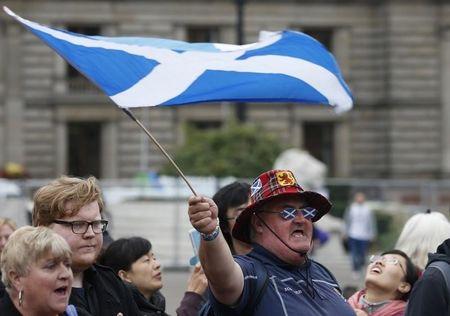LONDON (Reuters) - The United Kingdom is "living on borrowed time" if the government fails to listen to Scottish voters, Scottish nationalist leader Nicola Sturgeon said on Friday, the first anniversary of an independence referendum.
Sturgeon, who saw her Scottish National Party (SNP) take nearly all parliamentary seats in Scotland in May's national election, told Prime Minister David Cameron to start taking Scotland seriously or risk losing 8 percent of the population.
Scots voted by 55-45 percent in September last year to reject independence, but surging support for the SNP and the election of a pro-austerity Conservative government in London has spurred talk of a new referendum to end the more than 300-year-old union between England and Scotland.
Sturgeon said the SNP's rise was being driven by the government's failure to deliver on a promise of more powers for Scotland as well as pushing ahead with austerity and renewing Britain's nuclear weapons arsenal despite opposition in Scotland, where it is based.
"What happens to support for independence in the months and years to come will depend as much on what you do as it will on what we do," Sturgeon warned Cameron in a speech to supporters.
"Right now, you are living on borrowed time. If you continue to ignore Scotland's voice, if you continue to disrespect the choice that people across this country made in May, more and more people will conclude that Westminster simply cannot deliver for Scotland."
A promised vote on Britain's membership of the European Union has also fuelled passions in Scotland, which is more EU friendly than England, adding to the number of policy difficulties facing Cameron in his first majority government.
Cameron has ruled out a second Scottish independence vote, saying all sides had agreed to respect last year's result and it was "time to move on".
THE VOW
Sturgeon, who is wary of pushing for another vote until she is sure the nationalists can win, has said the SNP will include triggers for a second referendum in its manifesto for Scottish elections in May 2016.
If such triggers are met, the London-based government could find it difficult to refuse another vote to break up the United Kingdom, the world's fifth-largest economy.
Many of those who backed her party in May do not support independence but believed having SNP lawmakers in Westminster was the best way to make sure Scotland's voice was heard.
"It would be wrong to propose another referendum without a fundamental change of circumstances or a strong indication that a significant number of those who voted 'No' last year had changed their minds," Sturgeon said.
"But let me say this, it would also be wrong, in the face of a clear and material shift in circumstances or in public opinion, for any one politician or party to rule out another referendum indefinitely."
She said if Scotland was taken out of the EU against its will in the referendum due by the end of 2017, then demand for a second independence vote could be "unstoppable".
The Scottish debate is being echoed in Spain, where a long political struggle over Catalan independence is set to intensify with a regional election on Sept. 27.
In an echo of a important issue during the Scottish independence campaign, the European Commission said on Thursday that if any part of a member state broke away, it must also exit the European Union.
Spain's El Pais newspaper said the message was aimed at Catalonia, whose pro-independence leaders have said they would announce a unilateral breakaway if they win the regional election. But it could equally apply to Scotland.
Some in Britain's opposition Labour Party, which has only one lawmaker left in Scotland, hope the election of Jeremy Corbyn as their new leader could help give their party a second chance there and dent the nationalists' momentum.
Corbyn campaigned on an anti-austerity ticket and, like the SNP, opposes the renewal of Britain's Trident nuclear weapons.
The SNP says the government has failed to deliver on "the vow", a promise of more powers for Scotland made in the final days of campaigning before Sept. 18, 2014, vote after opinion polls showed a surge in Scottish separatist support.
While a YouGov poll this month found just 9 percent of Scots surveyed believed it had been delivered in full, it also showed 95 percent said they had voted the right way in the referendum.
"We all agreed...the independence referendum should be a 'once in a generation'," Cameron said in comments marking the first anniversary of the referendum. "Some may want to obsess about separation, but I am focused on delivering devolution."
(Additional reporting by William James, Editing by Elizabeth Piper and Angus MacSwan)





















Laissez un commentaire Votre adresse courriel ne sera pas publiée.
Veuillez vous connecter afin de laisser un commentaire.
Aucun commentaire trouvé